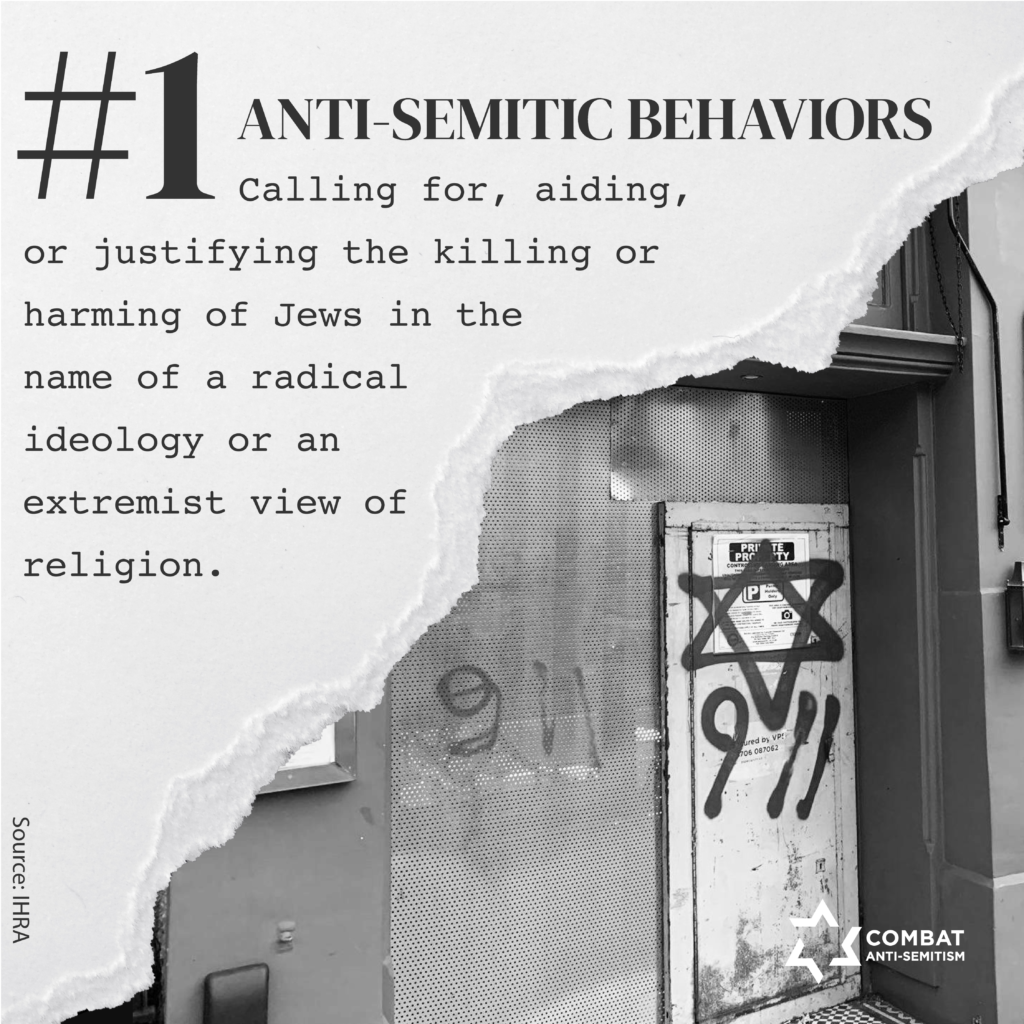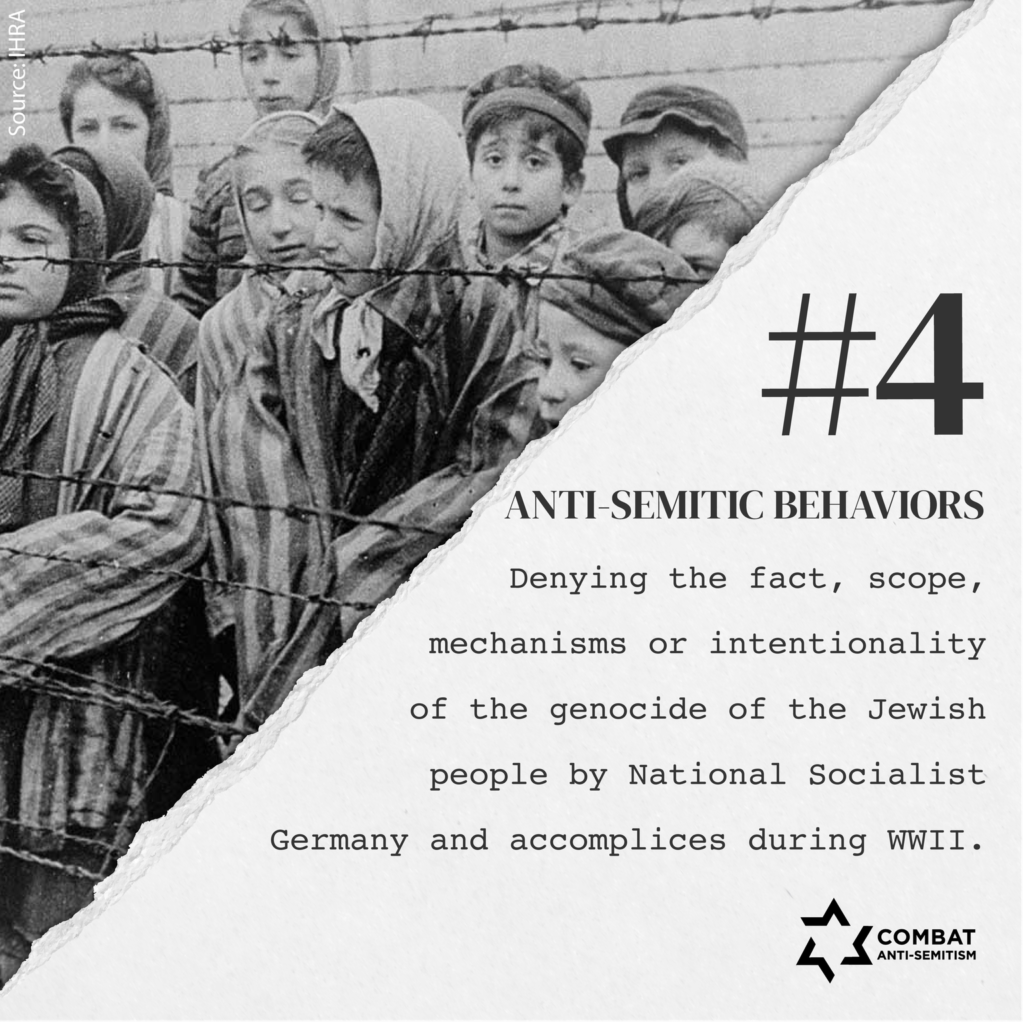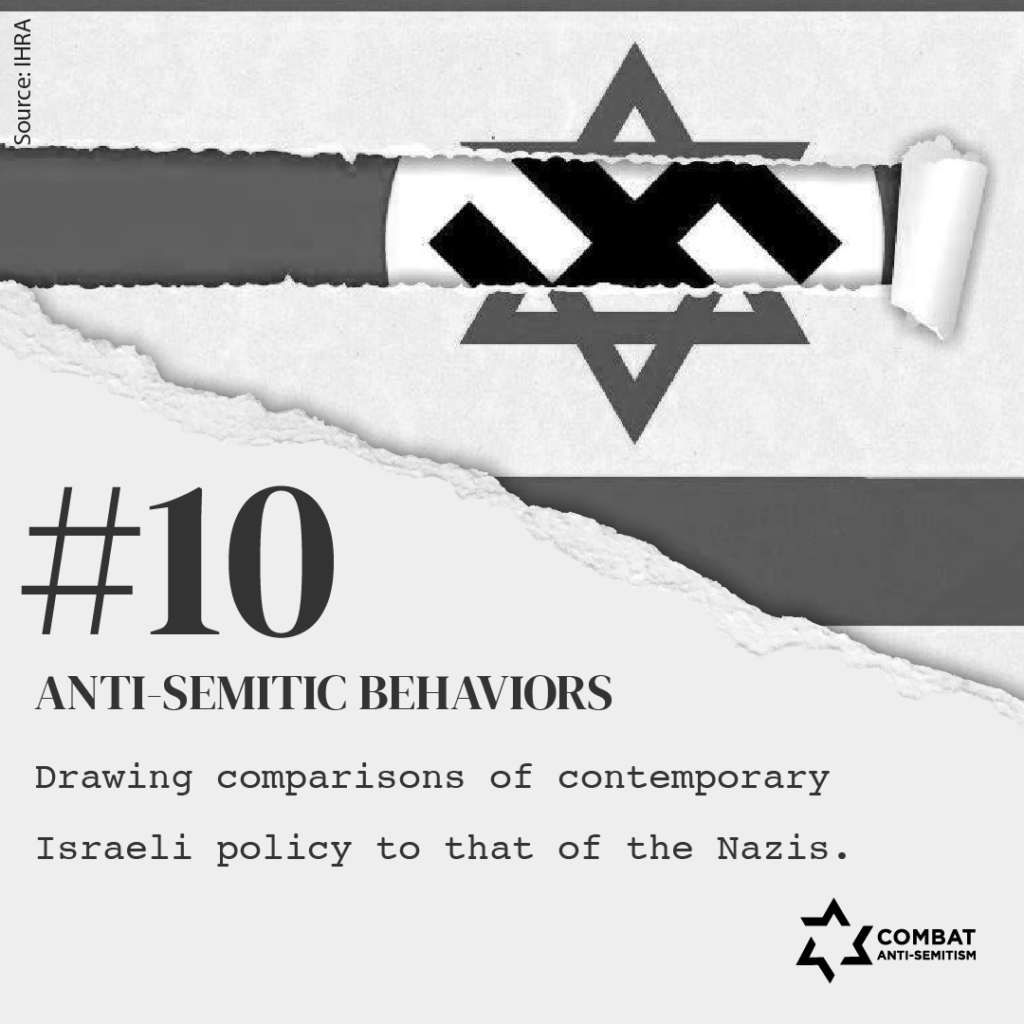

The IHRA Definition Explained
With the alarming resurgence of anti-Semitism around the world, agreeing upon and working from a universal definition is critical in order to combat various forms of anti-Semitism. A common definition can help form a legal framework to hold perpetrators accountable, change negative behaviors and standardize educational materials to halt the spread of anti-Semitism. The Combat Anti-Semitism Movement’s (CAM) pledge draws upon the International Holocaust Remembrance Alliance (IHRA) working definition of anti-Semitism and its list of specific behaviors used to discriminate against the Jewish people and the Jewish State of Israel.
The hatred of the Jewish people has mutated in the modern age. Anti-Semitism has begun to infect layers of society in ways never seen before in the post-war era and continues to take on new forms. Age-old anti-Jewish conspiracies and tropes are being repackaged in light of the enormous social and political stresses of our time. The often-quoted three primary sources of anti-Semitism (the far-right, the radical left, and political Islam) are again expanding as new anti-Semitic trends continue to emerge. According to the alliance, IHRA experts determined that in order to begin to address the problem of anti-Semitism, there must be clarity about what anti-Semitism is. The following non-legally binding working definition of anti-Semitism was adopted by the alliance’s plenary on May 26, 2016 in Bucharest:
“Anti-Semitism is a certain perception of Jews, which may be expressed as hatred toward Jews. Rhetorical and physical manifestations of anti-Semitism are directed toward Jewish or non-Jewish individuals and/or their property, toward Jewish community institutions and religious facilities.”
Together with Hadassah, the Combat Anti-Semitism Movement produced a short video to demonstrate the importance of the IHRA working definition of anti-Semitism and how it is a valuable tool in the fight against hate.
The IHRA Definition of Anti-Semitism: A Solution from Combat Anti-Semitism on Vimeo.
To guide IHRA in its work, the the inter-government organization developed a list of examples to highlight manifestations of contemporary anti-Semitism under the IHRA definition. Contemporary manifestations of anti-Semitism in public life, the media, schools, the workplace, and in the religious sphere could, taking into account the overall context, include, but are not limited to:
1. Calling for, aiding, or justifying the killing or harming of Jews in the name of a radical ideology or an extremist view of religion.
2. Making mendacious, dehumanizing, demonizing, or stereotypical allegations about Jews as such or the power of Jews as collective — such as, especially but not exclusively, the myth about a world Jewish conspiracy or of Jews controlling the media, economy, government or other societal institutions.
3. Accusing the Jews as a people, or Israel as a state, of inventing or exaggerating the Holocaust.
4. Denying the fact, scope, mechanisms (e.g. gas chambers) or intentionality of the genocide of the Jewish people at the hands of National Socialist Germany and its supporters and accomplices during World War II (the Holocaust).
5. Accusing Jews as a people of being responsible for real or imagined wrongdoing committed by a single Jewish person or group, or even for acts committed by non-Jews.
6. Accusing Jewish citizens of being more loyal to Israel, or to the alleged priorities of Jews worldwide, than to the interests of their own nations.
7. Denying the Jewish people their right to self-determination, e.g., by claiming that the existence of a State of Israel is a racist endeavor.
8. Applying double standards by requiring of it a behavior not expected or demanded of any other democratic nation.
9. Using the symbols and images associated with classic antisemitism (e.g., claims of Jews killing Jesus or blood libel) to characterize Israel or Israelis.
10. Drawing comparisons of contemporary Israeli policy to that of the Nazis.
11. Holding Jews collectively responsible for actions of the state of Israel.
The adoption of the IHRA definition of anti-Semitism and its implementation as a legal tool, are critical steps in the fight against anti-Semitism. While more and more governments, institutions and organizations have begun to adopt the IHRA definition globally, the definition also serves as an important and powerful educational tool for teaching about, and ultimately preventing the hatred of Jewish people.
Speaking on the merits of the IHRA definition, the Federal Republic of Germany’s Anti-Semitism Commissioner Felix Klein said, “In order to address the problem of anti-Semitism, it is very important to define it first, and this working definition can provide guidance on how anti-Semitism can manifest itself.”
In September 2020, the Combat Anti-Semitism Movement hosted a unique international forum entitled, “The IHRA Definition of Anti-Semitism: Eleven Examples, Eleven Stories.” The event featured the world’s foremost diplomats tasked with combating anti-Semitism from the US, UN, the UK and Germany. Alongside these diplomats, viewers heard first-hand accounts from eleven individuals who have experienced anti-Semitism, corresponding to the eleven examples of anti-Semitism under the IHRA definition.
The full recording of the event can be found below:
The adoption of the IHRA definition of anti-Semitism is an important first step in defining, recognizing and ultimately combating anti-Semitism. Comprehensive adoption of the IHRA definition in local, national, international jurisdictions, as well as in public and private institutions and settings will enable the world to more effectively confront anti-Semitic behavior wherever it may be found. Ultimately, for the IHRA definition to succeed as a tool in combating anti-Semitism, the definition must be formally incorporated into policy initiatives and legislative proposals as a mechanism to prosecute against and deter future anti-Semitic acts.
A full list of entities that has adopted the IHRA definition can be found here.



















